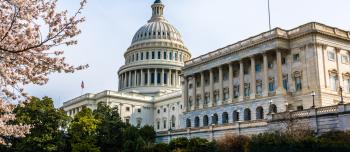Government Relations Update – October 2024
Election Day is November 5th. Please remember to cast your vote and ensure that your voice is heard!
Grassroots Advocacy: NBDF has launched “Voices for Policy Change!”. A one-stop shop for videos from community members on public policy topics, volunteer advocacy, the importance of Hemophilia Treatment Centers, and much more. Click here to access the webpage, videos and resources.
Federal
Washington Days: Registration for NBDF’s annual Washington Days national advocacy event will open Nov. 15 and close Jan. 17. More information on registration will follow closer to Nov. 15.
Copay Maximizers: NBDF led an effort with Reps. Carter (R-GA-01) and Barragán (D-CA-44) to send a Congressional sign-on letter asking the Departments of Health and Human Services, Labor, and Treasury (tri-agencies) to issue promised rulemaking to protect all patients from copay maximizers. The 2025 Notice of Benefit and Payment Parameters (NBPP) included a provision which will effectively ban the use of copay maximizers by individual and small group plans. But the NBPP does not apply to large-group and self-insured plans. To align standards across all insurance markets, the tri-agencies in April announced they would undertake additional rulemaking to extend this provision to all non-grandfathered plans. But the tri-agencies have not yet issued the promised rule. The letter to the tri-agencies requests that they issue this proposed rule as soon as possible.
2026 NBPP: On October 4, the Department of Health and Human Services issued the Notice of Benefit and Payment Parameters (NBPP) for 2026. While NBDF was disappointed that the proposed rule does not address copay accumulator adjustment programs or non-EHB strategies, such as copay maximizers and alternative funding programs, it does propose additional safeguards to protect consumers from fraudulent changes to their health care coverage. The proposed rule also includes changes which will make it easier for consumers to understand their costs and enroll in coverage through Healthcare.gov beginning in 2026.
U.S. Pharmacopeia Classification of Drugs for Bleeding Disorders
NBDF, with the Hemophilia Federation of America, the Coalition for Hemophilia B, and the Hemophilia Alliance, submitted comments on the Draft of the United States Pharmacopeia (USP) Drug Classification for 2025. USP drug classifications are important because they are the basis for creating health plan drug formularies – and for evaluating the adequacy of those formularies. Last year, NBDF and allied groups asked USP to revise its classification to appropriately differentiate among blood products based on what conditions and populations they treat, mechanisms of action, and routes of administration (currently, USP combines all bleeding disorders medications into a single category and class). In response, USP acknowledged differences among the products but declined to make the revisions requested. In this year’s comments, NBDF and co-signers reiterated our request and cautioned that combining all bleeding disorders products into a single category and class harms bleeding disorders patients by allowing for the adoption of unduly narrow formularies.
ACA Enhanced Advance Premium Tax Credits
Through its participation in the Partnership to Protect Coverage (PPC), NBDF continues to advocate for an extension of the Affordable Care Act’s (ACA) enhanced premium tax credits (APTCs) before they expire at the end of 2025. The ACA established the credits to help lower the costs of health insurance purchased in the Marketplaces. Since the start of the COVID-19 pandemic, Congress has acted twice to make these credits more generous – allowing more people to benefit and allowing people to receive more help – but only temporarily. The enhanced APTCs are now set to expire at the end of 2025, but Congress must act well before then to accommodate insurer rate-setting. Extending these critical subsidies is essential to prevent a spike in premiums and consequent loss of insurance coverage for millions of people. NBDF has participated in a number of meetings with Congressional staffers on this issue.
Charitable Giving Tax Deduction
NBDF supported a letter led by the Charitable Giving Coalition in support of the Charitable Act, which would restore and expand the charitable deduction for non-itemizers and incentivize giving from middle and lower-income families. Because of a change in federal law in 2017 fewer Americans itemize their taxes and consequently, do not receive any incentive to give to charity. Individual donations are vitally important to many non-profits, including NBDF.
State
New Jersey: The Hemophilia Association of New Jersey (HANJ) is leading the effort to ban copay accumulator adjuster programs in New Jersey. HANJ worked with Senate Majority Leader Nicolas Scutari to introduce S. 3818 for the 2024-2025 legislative session.
New York: New York State Bleeding Disorders Coalition Public Policy Director and community member, Bob Graham, attended the National Organization on Rare Disorders (NORD) conference as one of the leads of New York State’s Rare Disease Working Group. NYSBDC will be one of the lead organizations advocating for a permanent Rare Disease Advisory Council this legislative session.
North Dakota: NBDF and the Bleeding Disorders Alliance of North Dakota met with state Rep. Karen Karls Oct. 21 to discuss draft accumulator adjuster legislation that she will sponsor in 2025.
Pennsylvania: The Western and Eastern Pennsylvania Bleeding Disorders Foundation’s (EBPDF and WPBDF) have created and distributed “period packs” to Pennsylvania schools, including tampons and pads, undergarments, and other menstrual health materials with information about bleeding disorders. These packs are intended to raise awareness of bleeding disorders, particularly among women, girls, and people with the potential to menstruate (WGPPM). This effort comes after efforts in the legislature to make period products more accessible in schools and communities across Pennsylvania.
State Chapter Advocacy Days - 2025
Bleeding Disorders Association of South Carolina Legislative Breakfast: January 15
Virginia Hemophilia Foundation: January 27
Bleeding Disorders of the Heartland (Iowa): February 5
Pacific Northwest Bleeding Disorders (Oregon): February 10
Hawaii Chapter, NBDF: February 11
New York State Rare Disease Advocacy Day (Led by NYSBDC): February 25
Tennessee Hemophilia and Bleeding Disorders Foundation: March 11
New York State Bleeding Disorders Coalition: March 15
Hemophilia Council of California: March 17
Nevada Chapter, NBDF: March 26




